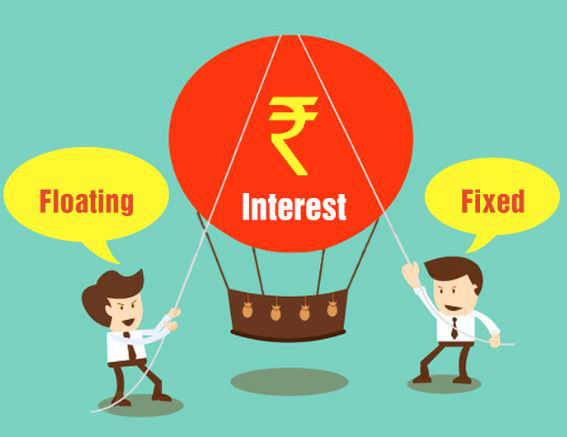While you avail a loan, there are two types of interest rate that you can choose from. These are fixed interest rate and floating interest rate. These rates depend on the MCLR, which is based on the repo rate published by the RBI. An MCLR or Marginal Cost of fund based Lending Rate is the rate that determines the minimum interest rate which financial institutions and NBFCs can offer.
What is a fixed rate?
A Fixed Interest Rate remains unchanged throughout the loan tenor irrespective of the changes in the MCLR. The EMIs of advances availed at such interest rate remains fixed throughout the tenor.
Advantages of fixed interest rate:
- The interest rate remains fixed even if there is an increase in the MCLR.
- Estimating your EMIs is easier with a fixed interest rate, and you can manage your finances better.
- The loan is much more secured as the interest rate does not fluctuate.
Disadvantages of fixed rates:
- If there is a drop in the MCLR, your interest rate will remain fixed, thus, preventing you from enjoying the benefits of lower interest rates.
- Fixed vs floating interest rate – fixed interest rates are 1% to 1.25% higher than floating interest rates, which makes your EMIs slightly expensive. Hence, while you avail advances like a loan against property do make sure to check the charges for your LAP.
- In case you desire to pre-pay your loan availed at a fixed interest rate, you will be charged with a minimal fee.
Fixed vs floating interest rate for a loan against property
- As mentioned, fixed interest rates are higher than floating interest rates making your EMIs expensive as compared to the EMIs for advances with a floating interest rate.
- There are no pre-payment fees while you avail advances with a floating interest rate whereas you will have to pay a pre-payment fee while pre-paying your loan with a fixed interest rate.
- The interest rate for a floating interest rate will change with the difference in the MCLR. This means if there is a drop in the MCLR, your interest rate will take a dip. No such changes will occur in case of a fixed interest rate.
Consider the above to compare between floating interest rates and fixed interest rate to consider the better option when you opt for a loan against property.
Which type is beneficial?
Before you opt for a loan, consider knowing the current MCLR to select the type of interest rate that is beneficial for you. Compare both fixed interest rate and floating interest rate depending on your requirement and source of income.
You can transfer to a floating interest rate once the fixed term ends. If you do so, evaluate your financial stability, as in the case, the MCLR increases the interest rate will also increase making your EMIs expensive.
Several financial institutions and NBFCs offer advances against property at an attractive interest rate. Bajaj Finserv is one such NBFC that provides Loan Against Property at a competitive interest rate against minimal documents. They also offer a prolonged tenor of up to 20 years, substantial loan amount of up to Rs. 3.5 Crore, online account access, instant approval and other lucrative benefits.
This NBFC has also introduced pre-approved offers to save your time and ease your application process. Pre-approved offers also help you to avail advances at a lower-interest rate. These pre-approved offers are available on various financial products such as business loans, home loans, personal loans, etc. You are required to share minimal details like your name and contact number to take a look at your pre-approved offer.
A fixed interest rate is beneficial while opting for a short-term long. For a long-term loan, floating interest is safer as if there is a drop in the MCLR, your interest rate will also take a dip lowering your EMIs and making it affordable.Hence, before opting for the loan must have an idea about Fixed vs Floating Interest Rate. To avoid hefty penalties on your loan amount and accumulation of debt, it is advisable to pay your EMIs on time. In case you are confused about the type of interest rate that will be beneficial for you, several financial institutions offer split interest rate using which you can pay a part of your loan at a fixed interest rate and the other part at a floating interest rate.
Also Read – How does the value of a property gets affected


